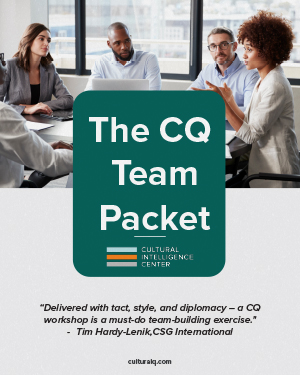Our family loves to watch the Amazing Race. Given our many travels together, we often think about how we would compete to cross the finish line first. And you can imagine the joy it gives me to hear my kids evaluating the CQ of the various participants based upon how they interact with the locals and describe the various stops along the way.
Many college students live out their own version of the Amazing Race by studying abroad. It’s estimated that more than 1 million students study abroad annually. And the number keeps rising.
When done well, the opportunity to study or serve abroad can be life changing. One of the greatest benefits of a semester or even a few weeks overseas is the opportunity to discover one’s self and gain hands-on experience learning to be effective in a different culture. But the experience by itself does not guarantee this. For many students, the time overseas ends up being little more than moving campus life from Columbus to Barcelona. One study found that on average, U.S. study abroad students spend more than four hours per night communicating with friends back home on Facebook and Skype. If not done well, international experiences like these can actually erode cultural intelligence and perpetuate ethnocentrism rather than improving CQ.
7 Ways to Improve CQ while Studying and Serving Abroad
What makes the difference? Ultimately, the value of an overseas experience rests in the individual but universities and organizers can play a powerful role in shaping study abroad programs to have lasting impact.
1. Select and prepare facilitators and faculty carefully
Every trip will have participants who go for the pub-crawl or simply for a change of scenery. But the selection and preparation of facilitators and faculty is the most important thing to consider. These are the individuals who help students interpret the experience. And the ways these mentors talk about the culture and personally interact with it will be far more influential to students than any formalized cultural training you give them.
2. Assess CQ Before
Assess students’ cultural intelligence before they leave. The feedback they receive will help them focus on their CQ strengths and opportunities for improvement. In addition, just the process of answering the questions in the assessment is educational by getting students to reflect upon their intercultural perspectives and experiences.
3. Local Internships
Rather than simply relocating lectures to a different culture and time zone, take advantage of local learning opportunities. Many students won’t take the initiative to get involved locally unless it’s required. At the most basic level, require them to travel to various sites like museums, cultural icons, and even grocery stores and shopping centers to discover what’s similar and different from home. Then assign them to set up meetings and interviews with local experts. Require a local internship related to their studies.
4. Home Stays
Living with other international students in the dorm can definitely be valuable but it’s often little more than another extension of university-life back home. If at all possible, have students stay in local homes. Living and communicating with a family provides a much more visceral experience than another semester of dorm life. And lifelong friendships are often developed as well.
5. Amazing Race-like adventures
Drop students somewhere with a limited amount of money and require them to find their way back to your central location. You’ll be amazed at how resourceful they become when they aren’t simply waiting for the program facilitator to announce the next thing on the agenda. They’ll overcome their fear of using the local language when it’s their only means to communicate. Show them that they have more intercultural skills at their fingertips than they may think they do.
6. Guide Re-entry
Some students experience far greater culture shock when they get home than when they go abroad. Many friends and family aren’t interested in hearing much about their experience and many of the students overlook the opportunity of continued intercultural encounters with international students on campus back home. In addition, many job recruiters complain that most students can’t explain how their study abroad experience will improve their effectiveness in the workplace. Students need help in transferring the learning from overseas to life back home.
7. Re-assess CQ
Assess students’ CQ again upon their return. This gives students (and universities!) a tangible way of measuring the impact of the experience upon a students’ intercultural effectiveness. In addition, study the aggregate data from all the students who participate to compare how various programs fare in developing CQ.
As students, families, and institutions invest growing amounts of money in studying and serving abroad, it’s essential that we take time to develop effective programs and assess their role in improving participants’ cross-border effectiveness. I’ve only scratched the surface of ways to improve these experiences. I’d love to hear what you’re doing if you’re involved in this fascinating opportunity for growing CQ!
